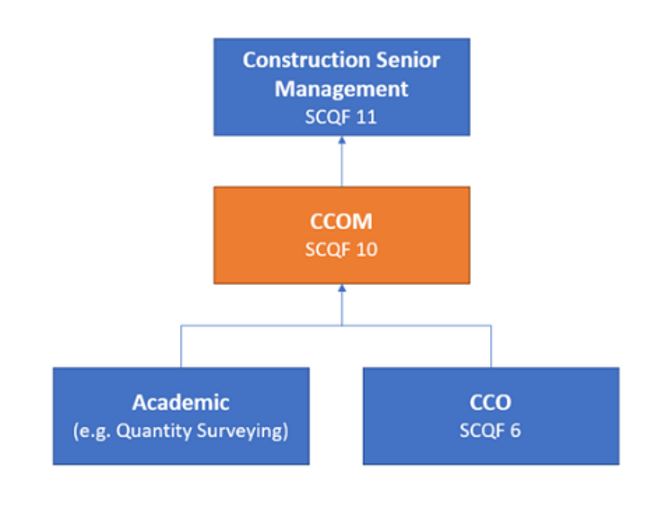Construction Contracting Operations Management Modern Apprenticeship increase from SCQF Level 9 to SCQF Level 10
Overview
Background
Construction Contracting Operations Management currently sits in a Modern Apprenticeship Framework at SCQF Level 9. As a result of a recent NOS review the underlying SVQ has increased to SCQF Level 10.
The following document details the process undertaken as part of the review, a brief understanding of the changes, and the rationale to continue with Construction Contracting Operations Management as part of a Modern Apprenticeship.
This will require a new Professional Apprenticeship to be created at an SCQF Level 10 and the removal of the old qualification from the Technical Apprenticeship at SCQF Level 9.
NOS Review and National Working Group
In October 2020 the National Working Group (NWG) for Construction Contracting Operations Management (CCOM) was formed to review the suite of National Occupational standards (NOS) to ensure that they reflected the needs of industry. The NWG met regularly over a twenty four month period to review all aspects of the NOS. The focus of the review was to ensure that the needs of all employers across the UK were satisfied for this key construction role.
The working group was composed of individuals across all home nations and represents a range of industry expertise, skills, and knowledge.
In 2022, the NOS review was completed, and the working group fully supported the formulation of the NOS suite into vocational qualifications. Therefore, the units were put forward to be SCQF rated through a process of credit and levelling.
Credit and Levelling
The SCQF level of the overall qualification was checked, taking into consideration the new credit rating and credit points for each individual unit. This analysis showed that due to the increase in credit value of the five mandatory units, the overall level of the qualification had moved from an SCQF level 9 to an SCQF level 10.
Taking into consideration the feedback received throughout the Credit & Levelling process it was felt that this increase was justified due to the increased responsibility and oversight required of Construction Contracting Operations Managers in a post-Grenfell world. The key aspects of accountability and autonomy were stressed throughout the units and the group felt that the general push towards increasing competency and capabilities of the workforce justified the increase. This creates a higher demand on candidates covering increasingly complex elements.
The qualification is now live and has been accredited and deployed as an SVQ across Scotland by SQA. It has now been requested that it forms part of a MA Framework with centres already waiting to put their learners on the new Level 10 qualification as part of an apprenticeship.
Qualification Structure
Towards the end of the NOS review process, the NWG looked at the recommended qualification structure (RQS) for the vocational qualification. Originally, the qualification consisted of five separate pathways (option routes) as follows:
- Estimating
- Buying
- Planning
- Quantity surveying
- Generalist
Preliminary research at the beginning of the review process had shown that the vast majority of registrations & certifications in the last 5 years were for the generalist route.
Construction Contracting Operations Management
|
2017 |
2018 |
2019 |
2020 |
2021 |
2022 |
2023 |
Route totals |
|
|
Estimating |
1 |
3 |
5 |
10 |
9 |
10 |
|
38 |
|
General |
20 |
9 |
17 |
35 |
59 |
55 |
6 |
201 |
|
Planning |
1 |
3 |
|
2 |
|
3 |
|
9 |
|
Quantity Surveying |
1 |
4 |
4 |
8 |
8 |
4 |
|
29 |
|
Yearly totals |
23 |
19 |
26 |
55 |
76 |
72 |
6 |
|
This fact prompted the NWG to question the need for the five individual pathways. It was suggested that a better way would be for there to be a single (generalist) pathway only. The qualification would consist of the existing 4 mandatory core units, plus the additional mandatory core unit due to the importation of unit COSVR740. Candidates could then select the optional units that they could provide evidence for (dependant on their role). The qualification would therefore consist of a total of 5 mandatory units plus 4 optional units (selected from 14 available). This would give a greater flexibility to the qualification, which was always considered to be its strength.
CITB are inviting feedback on the addition of the new qualification into a Professional Apprenticeship at SCQF Level 10, and CITB would like to hear from employers, training providers, awarding bodies, assessors, and other stakeholders in Scotland to ensure industry feels there is a requirement for its implementation.
Progression Route


Share
Share on Twitter Share on Facebook